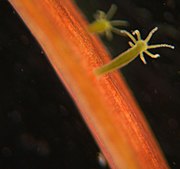See my new article on the top software picks.
In short, the suggestions are:
1. Malwarebytes Anti-Malware
2. Vuze
3. TeamViewer
4. RoboForm
5. TuneUp Utilities 2010
Click here to see the full article "Top 5 Free Software Picks for 2010".
Saturday, November 14, 2009
Saturday, November 7, 2009
The Feeling of Immortality
 In my rather random research, I have found two animals that are "biologically immortal". They technically just keep regenerating and never actually "die".
In my rather random research, I have found two animals that are "biologically immortal". They technically just keep regenerating and never actually "die".According to Wikipedia: "The Hydrozoan species Turritopsis nutricula is capable of cycling from a mature adult stage to an immature polyp stage and back again. This means that there may be no natural limit to its life span. However, no single specimen has been observed for any extended period, and it is impossible to estimate the age of a specimen. Theoretically, this cycle can repeat indefinitely, rendering it biologically immortal until its nerve center is removed from the rest of the body."
However, Wikipedia is often inaccurate (not wrong, just inaccurate). I could find no information on this animal in the paid subscription websites Britannica Online Encyclopedia or World Book Student.
The Wikipedia article on Turritopsis nutricula also mentions the predatory species Hydra, another kind of cnidarian that is claimed to be immortal.
Now, I found an article on this creature on both Britannica Online Encyclopedia and World Book Student!
Britannica Online Encyclopedia mentions that Hydra is "a genus of invertebrate freshwater animals of the class Hydrozoa (phylum Cnidaria)." It is an "organism [that] consists of a thin, usually translucent tube that measures up to about 30 millimetres (1.2 inches) long but is capable of great contraction... All Hydra species feed on other small invertebrate animals such as crustaceans." However, it makes no mention of the species being supposedly "biologically immortal".
Nevertheless, I found positive evidence on the World Book Student website. L. Muscatine, Ph.D., Professor Emeritus of Biology, University of California, Los Angeles states: "Hydras can regenerate (regrow) parts of their bodies. It is estimated that in a period of several weeks a hydra replaces all the cells in its body. The hydra, therefore, never grows old."
I think this constitutes sufficient evidence to prove that this Hydra animal is biologically (but not physically if it gets eaten) immortal.
Sources: http://en.wikipedia.org/wiki/List_of_long-living_organisms
http://en.wikipedia.org/wiki/Turritopsis_nutricula
"Hydra." Encyclopædia Britannica. 2009. Encyclopædia Britannica Online School Edition. 7 Nov. 2009
Muscatine, L. "Hydra."
Subscribe to:
Comments (Atom)